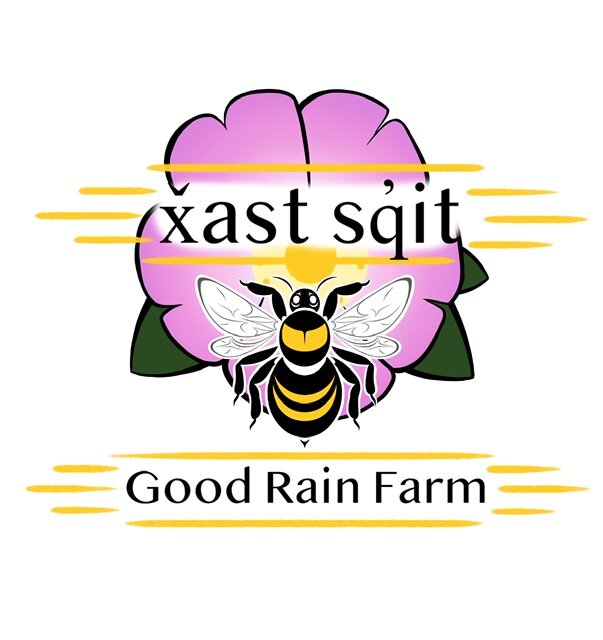A New Chapter for Good Rain Farm: Rooted in Community, Growing Toward the Future
Hello Friends, Family, CSA Members, and Our Beloved Community at Large,
It’s been a while since I’ve reached out, and I want to take this moment to reconnect, share some honest reflections, and invite you into this new and exciting chapter of Good Rain Farm—your local, woman-owned, Indigenous-led community supported agriculture (CSA) and market farm in Troutdale, Oregon, dedicated to fresh food, right relationship with land, and community nourishment.
The Journey to Our Forever Farm
Most of 2024 was about staying afloat—emotionally, financially, physically—and wrangling the dream we’ve been nurturing for years: purchasing our Forever Farm. In November, we finally closed! Through the winter holidays, we packed up and moved not only our home of 10 years, but also the entire farm operation we’ve stewarded for the past five.
While it was a celebration, it came with more than a few growing pains. The new site includes an old dairy barn, charming but not exactly farm-ready. With low ceilings, awkward doorways, and no existing irrigation infrastructure, we’ve had to get creative and scrappy—hallmarks of any small diversified organic farm. The fields were previously pasture for beef cattle. That’s a far cry from the loamy, nurtured beds we need to grow fresh vegetables, First Foods, and Indigenous crops.
What We’re Growing (And Growing Through)
January and February were tough. Our propagation setup—the greenhouse where the season begins—was stuck in the soggy, inaccessible back end of our previous site. With no new propagation house in place, our early season planting was delayed.
Then in March, my Significant Other suffered another stroke, following several surgeries. This one brought new complications: vision loss, reduced mobility, and cognitive impacts. Caregiving became part of my daily routine again, even as I tried to prepare the soil, hire a team, and rework or build new systems from scratch altogether.
It’s in moments like these that the value of community-supported agriculture truly shines. I’m endlessly grateful for the patience, encouragement, and support from our CSA members, collaborators, and neighboring farms. Thank you for standing with us.
Growing Food, Relationships, and Infrastructure
By mid-April, we finally brought on new crew members, and since then, we’ve been in full build-up mode:
Hiring and onboarding our farm team
Rewriting our Employee Manual for greater clarity and equity
Updating our Farm Safety & Security Manuals
Developing and submitting our Farm Operations Plan to meet the requirements of the Bridge Award (a $20K grant to support this massive transition)
We also left behind old weed barrier due to concerns over weed seed, disease, and pest transfer. We’re currently working to retrieve our beloved Camas Lilies and Sunchokes from the old site—two culturally significant plants that play a role in our mission to reconnect people to Indigenous First Foods.
Why Supporting Local Farms Matters (More Than Ever)
The challenges we’ve faced aren’t unique. Across the country, small-scale organic farms are weathering climate instability, land access barriers, labor shortages, and rising operating costs. Yet we continue to rise—not just to grow food, but to grow justice, sustainability, and resilience.
When you choose to support local CSA farms like Good Rain, you’re investing in:
Regenerative Agriculture
We grow without synthetic chemicals, prioritize soil health, and use techniques that build biodiversity and reduce water waste. Just as our ancestors did it, in balance, harmony and reciprocity.
Seasonal Fresh Produce
Each week, our CSA members receive a bounty of fresh, nutrient-dense vegetables and herbs—grown within miles of your table and harvested at peak ripeness.
Community Health & Food Sovereignty
Your support helps fund our sliding scale CSA options, scholarships, and pay-what-you-can shares, ensuring healthy food access for BIPOC, queer, and low-income neighbors.
Socially Conscious Farming
As an Indigenous woman-led business, we don’t just grow food—we’re reclaiming ancestral foodways, honoring our Sinixt heritage, and advancing a model of economy based on care, reciprocity, and relationship.
What’s Next: Soil, Seeds, and Systemic Change
As of June, we’ve cobbled together a temporary irrigation system and things are starting to hum along. But there’s still so much ahead:
Building permanent infrastructure: high tunnels, powering our wash/pack stations, expanding and improving our propagation space, and continuing to prepare additional land for production.
Installing efficient drip irrigation and installing rain water catchment to help offset our lack of water rights.
Expanding our Indigenous Foods beds, including Camas, Sunchoke, Nettle, and Bitterroot
How You Can Support
Share the Word
Follow us on Instagram, Facebook, and share our story with your friends and family looking to eat healthier, reduce their carbon footprint, or support BIPOC-owned farms.
Sponsor a CSA Share
We run a Scholarship Fund that helps us subsidize CSA shares for families in need. Consider making a contributuon today.
Volunteer or Join a Work Party
We’re organizing volunteer days this summer to help us steward this land in right relations. Get your hands in the soil and your spirit fed—keep an eye out for our volunteer list!
Final Thoughts
This journey has been exhausting and exhilarating. Farming is never easy—but it is sacred work. It’s been deeply humbling to be reminded that growth is rarely linear, and sometimes the greatest fruits come after the hardest seasons.
Whether you’ve been with us since our early days or you’re just discovering us now, I want you to know that your support truly sustains us. Not just financially—but spiritually, emotionally, and communally.
From my heart to yours, thank you.
With gratitude,
Michelle Week

